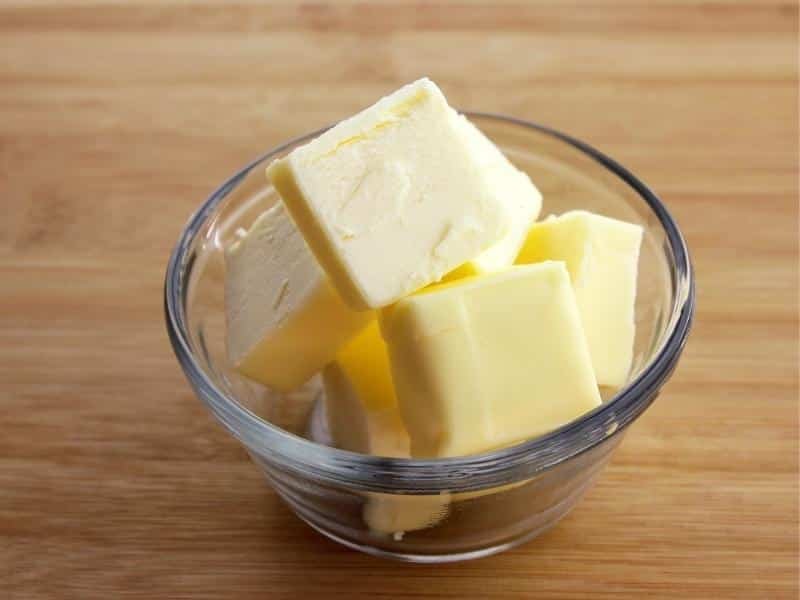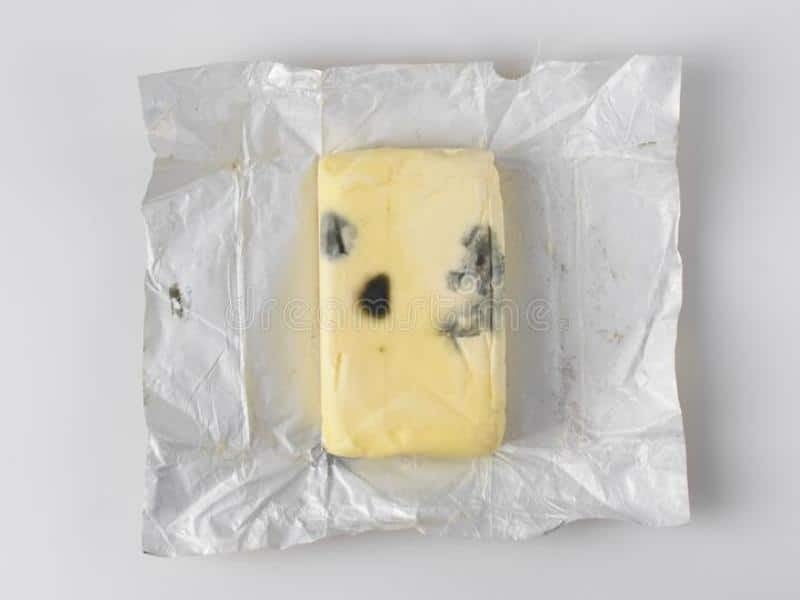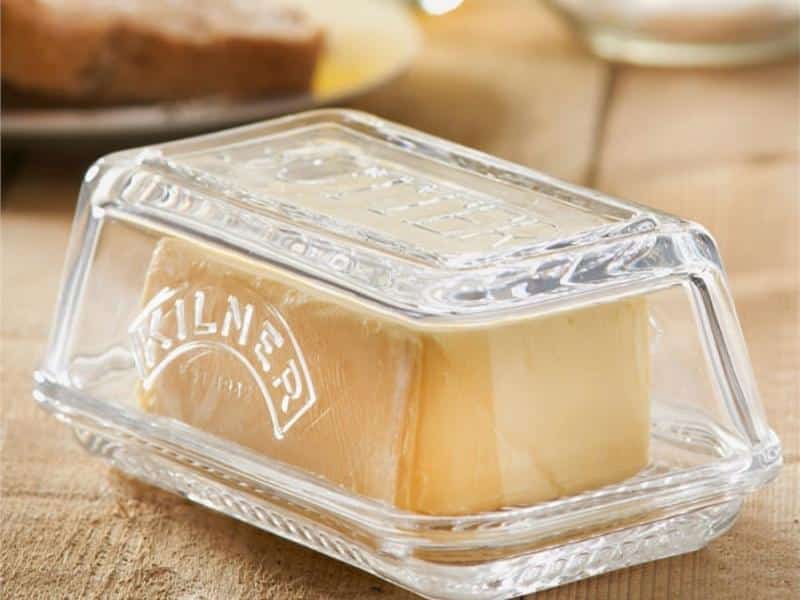Does Butter Go Bad?
Yes, butter goes bad if it’s not stored correctly or used within the recommended time. Butter is a resilient dairy product but it is not spoil-proof. Butter is the longest-lasting dairy product, made with only 4% milk solids. The product’s high fat content becomes rancid when exposed to environmental elements.
The US Dairy Export Council explains that most types of butter contain 80%, or more, fat content along with a low water content that prevents bacterial growth. Bacteria thrive in products with higher water and lower fat percentages.
Salted butter has even lower water percentages because of high sodium levels, so salted butter varieties last longer on a counter.
How Long Does Butter Last: Shelf Life of Butter

Salted varieties of butter last three weeks at room temperature above 70°F, four months in the fridge, and up to a year in the freezer. Unsalted butter lasts up to two weeks at room temperature, three months when refrigerated, and six to nine months in a freezer.
The shelf life of butter depends on exposure to natural elements like light, oxygen, and heat. Sunshine and oxygen can cause the butter’s fat to turn rancid, and heat can change the shape and texture.
How to Tell if Butter Has Gone Bad

Sour smells, rancid tastes, discoloration, mold, and different textures indicate that butter has spoiled.
Changes in Smell
Spoiled butter develops funky or putrid smells. The butter smells slightly sour because it’s a dairy product. Dairy products become sour when they go bad.
Changes in Taste
Butter tastes slightly acidic once it goes rancid. The sourness increases as the butter spoils more. Badly-spoiled butter tastes bitter and sour. The butter may develop a soapy or blue cheese flavor if the product is far beyond the expiry date.
Changes in Color
Rancid butter develops darker color patches, where the butter looks more yellow on one end than the other. Rancid butter also forms a darker yellow layer around the stick.
Visible Changes
Black dots on butter indicate mold growing on a spoiled product. Such products are dangerous to eat because some molds produce harmful toxins.
Changes in Texture
Bad butter looks like the fat and water are separating. The butter becomes softer and seems melted. Texture changes are only seen when butter is well past the “best before” date.
Can You Eat Expired Butter?
Yes, you can eat expired butter if it hasn’t turned rancid yet. Expired butter that tastes, smells, and looks normal can’t cause food poisoning. However, expired butter that has a rancid smell and visible mold can cause diarrhea and stomach aches.
Storing Butter

Storing butter in ideal conditions extends its shelf life by preventing exposure to light, oxygen, and poor temperatures. The proper butter storage depends on whether the butter stays in the fridge, freezer, or on the counter.
Counter: Room Temperature
The best way to store fresh butter on the counter is in a butter dish, opaque container, or butter bell at 70°F or less.
Butter should be kept in a cabinet away from bright light if using an opaque dish or transparent butter dish. Salted butter can be safely stored on a counter for three weeks, and unsalted butter for two weeks. Consider only keeping half a butter stick on the counter at a time.
Room temperature butter is ideal for spreading and baking. Place the butter in the fridge if the room temperature exceeds 70°F, or the butter will turn rancid.
Refrigerator
The best way to store butter in a refrigerator is in an airtight container, with the stick of butter remaining in its original foil packaging. Lockable storage containers work well in the fridge because butter will quickly absorb the flavors and smells of other foods around it.
Don’t place butter on top of meat or other strong-smelling foods. Keep the airtight container away from leftovers, garlic, and seafood. Unopened butter sticks in foil packaging should also be stored in an airtight container because the packaging won’t protect them.
Place the container in the coldest part of the fridge at 40°F or less. Fridge butter is hard and needs to be removed and let sit for a while before using it. Consider keeping half a stick on the counter to avoid having to make temperature changes to use the butter.
Salted variants of butter last four months in a fridge, while unsalted variants last three months.
Freezer: Can You Freeze Butter?
Yes, you can freeze salted butter for up to one year and unsalted variants for up to nine months. The best method for storing the butter in the freezer is in its original container, or foil packaging, inside an airtight container.
Frozen butter also absorbs flavors around it. Place the butter stick away from other strong-smelling aromas, seafood, and meat inside the freezer. According to the USDA’s National Agricultural Library, you can freeze butter two to three days after purchasing the product to extend the product’s freezer life.
The ideal freezer temperature to store butter is 0°F or less. Leave enough butter out on the counter and in the fridge before freezing the rest, to avoid constant temperature and environmental changes that spoil the butter.
Tips & Tricks
Airtight containers are the best ways to store butter in the fridge or freezer, and butter bells work perfectly for storing butter at room temperature.
These tips will also help keep butter fresh:
- Keep a small butter stick on the counter, half a stick in the fridge, and the rest of the butter sticks and containers in the freezer to maintain the ideal balance of freshness
- Keep counter butter away from sunlight, windows, ovens, and stoves to avoid constant temperature changes
- Put butter in the fridge if summer temperatures exceed 70°F, and freeze extra butter to extend the butter’s shelf life until the product is needed
- Use sturdy, lockable airtight containers that won’t deteriorate after a few freezer sessions
- To avoid storage issues, make your own homemade butter when it’s needed.





